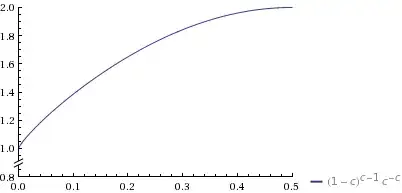Hint: Use the Stirling formula.
When you do so, it remains
$$
\binom n{cn}\sim
\frac{1}{\sqrt{c(1-c)n}c^{cn}(1-c)^{(1-c)n}}
=\frac{1}{\sqrt{c(1-c)n}}
\left(c^{-c}(1-c)^{c-1}\right)^n
$$
For $n$ large enough and $d>
(1-c)^{c-1}c^{-c}$, you have
$$
\binom n{cn}< d^n
$$
Now as $c<1/2$,

you can take $d$ such as
$$
(1-c)^{c-1}c^{-c}<d<2
$$
A direct proof of the last inequality is also possible:
using the AM-GM inequality,
$$
(1-c)^{c-1}c^{-c}
=\left[\frac 1{1-c}\right]^{1-c}
\left[\frac 1{c}\right]^{c}<
\frac 1{1-c}{1-c} + \frac 1cc=2
$$
with a strict inequality because $c\neq \frac 12 \implies 1-c\neq c$
